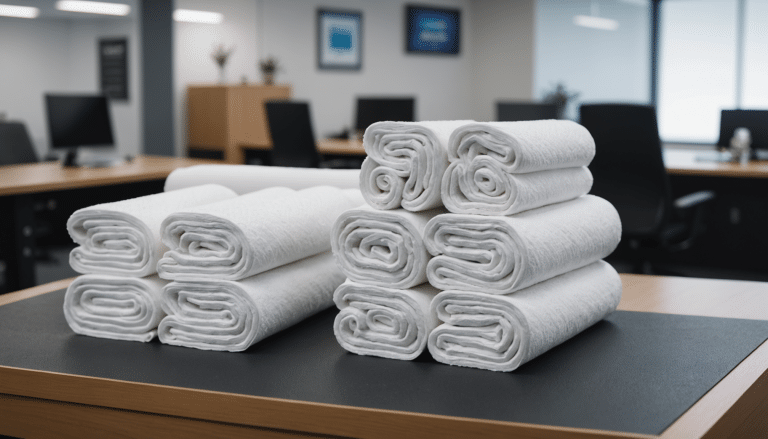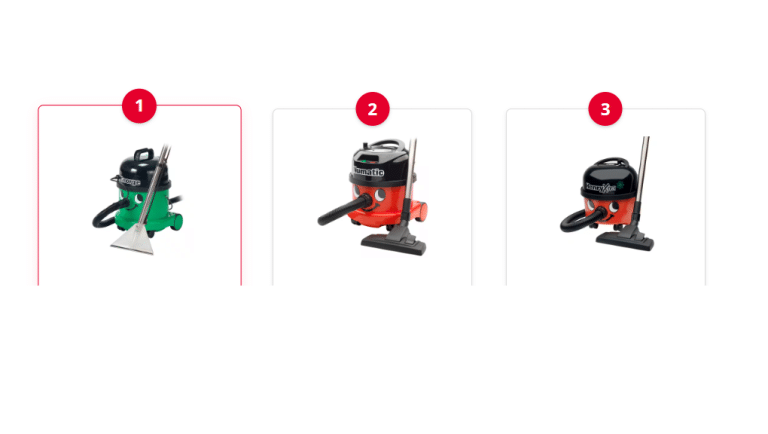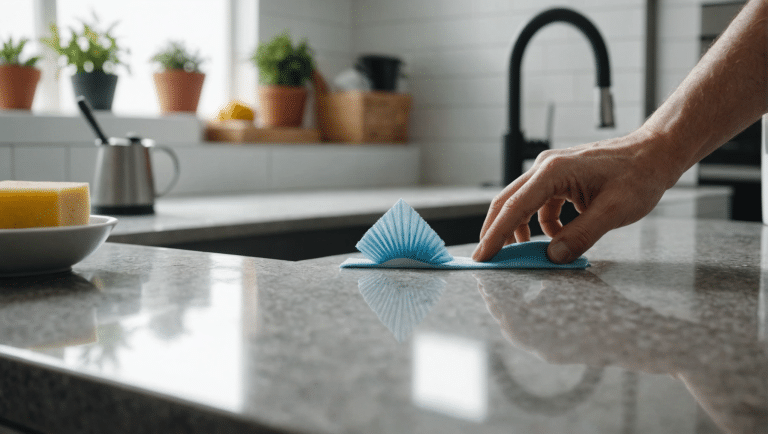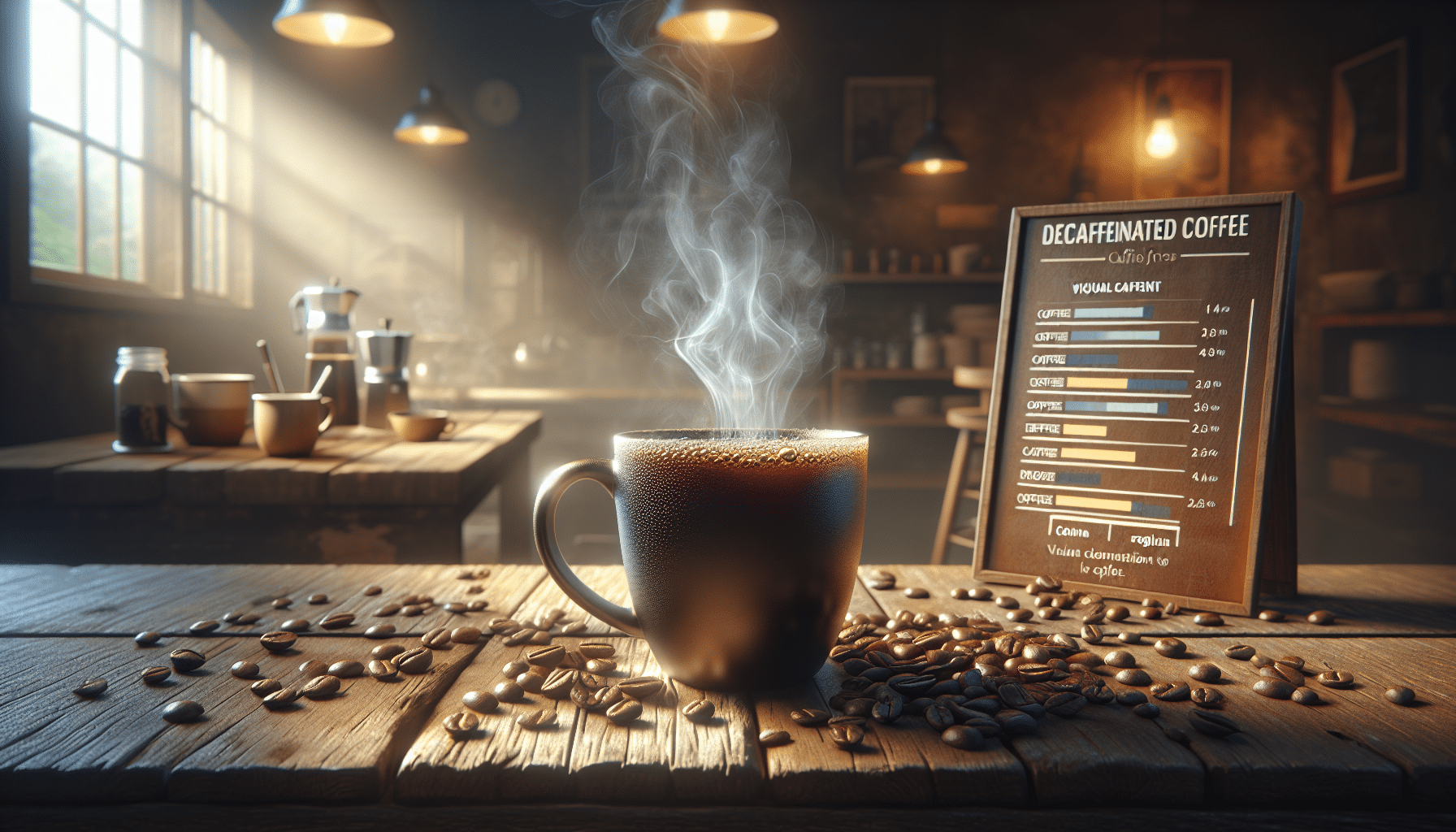
Residual Buzz: Just How Much Caffeine is Still in Decaf Coffee?
Curious about how much caffeine is in decaf coffee? Explore the nuances of decaffeination, understand how it affects your brew, and see where decaf stands against regular coffee.
Welcome to our exploration of coffee! Today, we’re focusing on a common question: what’s the caffeine content in decaf coffee compared to regular coffee? If you’re curious about how your decaf stacks up, you’re in the right place. Let’s take a detailed look at this topic.
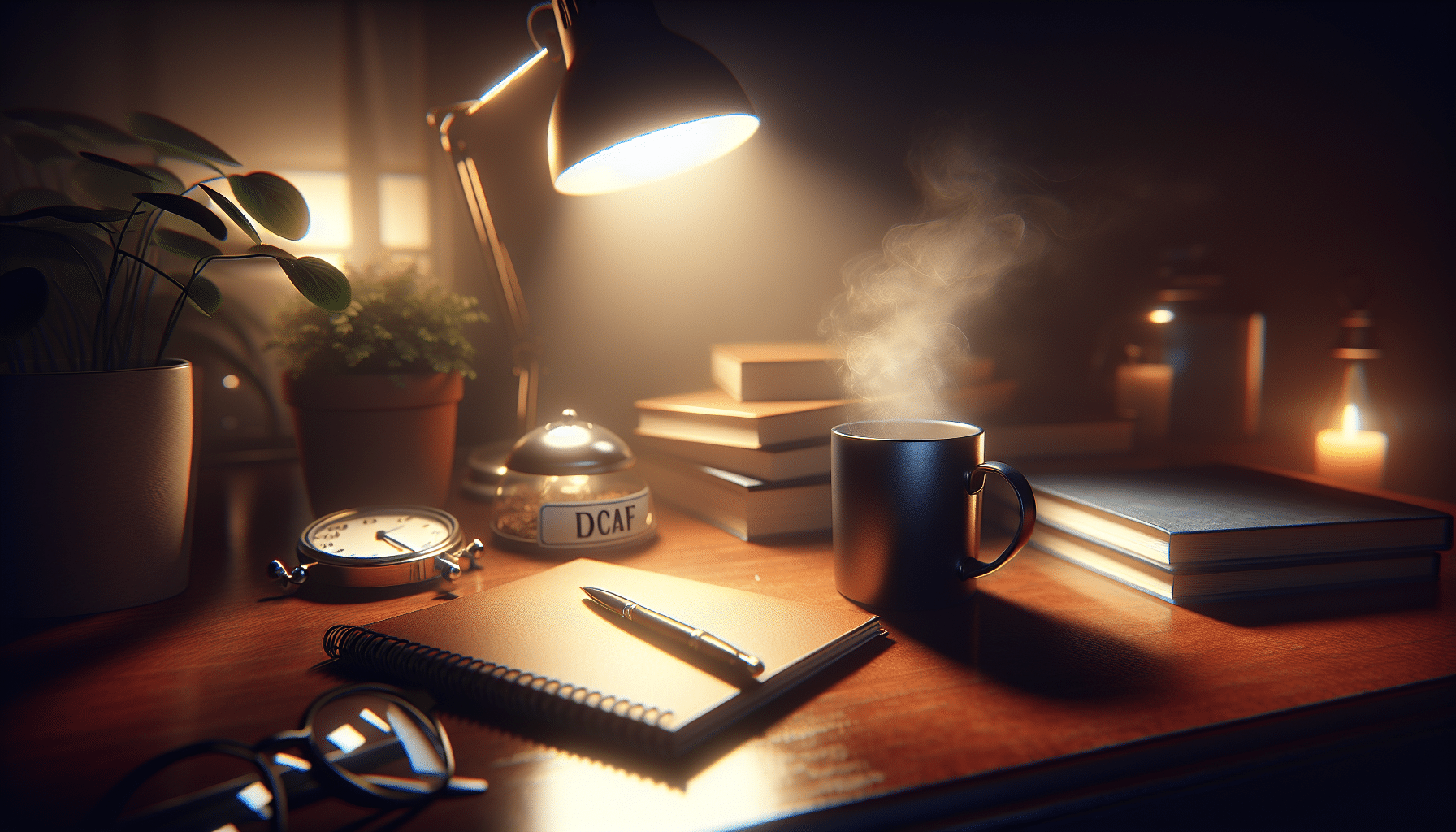
Key Takeaways
Decaf coffee, produced by treating coffee beans to remove caffeine, still retains a small, yet significant amount of caffeine.
Decaf isn’t entirely caffeine-free. A typical cup retains about 2-12 milligrams of caffeine, significantly less compared to regular coffee.
Decaf provides a gentler coffee experience, ideal for those sensitive to caffeine or advised to moderate their caffeine intake.
Understanding Decaf Coffee: What does decaffeinate mean and is decaf coffee healthy?
If you’ve ever sipped a freshly brewed cup of decaf coffee, you’ve probably wondered what exactly happens to those coffee beans to bring you a less caffeinated, yet flavorful pick-me-up. In the decaffeination process, coffee beans are treated before being roasted to remove caffeine. However, no method is 100% effective, so decaf coffee still retains a small amount of caffeine.
What’s left is a coffee bean with much less caffeine that you love and allow us to enjoy our treasured coffee tradition even late into the evening. Hyperactive coffee lovers can rejoice, decaf brewing and tasting experiences have come so far that they rival their regular counterparts in taste and aroma.
Health-wise, drinking decaf coffee isn’t likely to disturb your sleep or stimulate your heart rate like regular coffee might. What a relief! Plus, it still packs a punch with antioxidants, which could potentially contribute to cell health and longevity. Decaf coffee, it seems, embodies the best of both worlds: the richness of coffee without the jitters.
Caffeine Content: How much caffeine in coffee?
A regular cup of coffee, by comparison, packs a more significant caffeine punch. The average 8-ounce cup of coffee contains about 95 milligrams of caffeine, that’s about eleven times more caffeine in coffee as opposed to decaf.
The global affection for coffee isn’t just about the rich aroma and distinct flavor. The caffeine in coffee boosts energy, concentration, and even mood. A cup of coffee can quickly chase the cobwebs of sleep away. However, drinking coffee can be a delicate balance. Too much can tip the scale towards restlessness, an upset stomach, or even muscle tremors.
That’s why it’s essential to moderate your caffeine intake and know precisely how much caffeine is in both regular and decaf versions of your favorite beverage. So the next time you pour a steamy cup, you’ll be more informed about what’s inside.
Caffeine Comparison: Caffeine content in a cup of decaf coffee versus regular coffee
Let’s dive deeper into how much caffeine is in decaf coffee compared to regular coffee. As we conversed before, decaf isn’t entirely void of caffeine. A cup of decaf coffee harbors about 2 to 12 milligrams of caffeine. Whereas, a fair share of about 95 milligrams of caffeine is present in regular coffee.
Interestingly, the caffeine content in a cup of decaf coffee can vary depending on factors such as the type of coffee bean, the decaffeination process used, and how the coffee was brewed. But even with these variables, anyone switching from regular coffee to decaf massively decreases their caffeine intake.
So no, opting for a cup of decaf coffee doesn’t mean you’re completely giving up caffeine — but it does mean significantly less of it will be coursing through your veins. Less caffeine, more peace of mind. Now here’s some, decaf!
| Type of Coffee | Average Caffeine Content |
|---|---|
| Regular Coffee | 95 milligrams |
| Decaf Coffee | 2 to 12 milligrams |
Why People Drink Decaf: Lowering caffeine intake with decaf coffee
Gone are the days when drinking coffee unavoidably included a high caffeine infusion. Thanks to decaf coffee, you can enjoy your brew without feeling like you’ve had an adrenalin shot. Decaf coffee is the ideal choice for individuals who are sensitive to caffeine or advised to limit their caffeine intake.
The reasons are worthy — lower anxiety levels, reduced heart rate, and improved sleep quality. If you’ve ever had an unpleasant buzz after a regular coffee, decaf offers an exciting leap towards a gentler coffee experience.
So, the next time your beloved heart shouts for a coffee, but your mind reminds you about your caffeine intake, guess what, a cup of decaf is there to save the day (or night)!
| Type of Coffee | Impact on Sleep | Stimulates Heart Rate? |
|---|---|---|
| Regular Coffee | May disturb sleep | Yes |
| Decaf Coffee | Less likely to disturb sleep | No |
Decaf Not Caffeine-Free: The Facts about Residual Caffeine in Decaf Coffee
However, it’s essential to remember that decaf isn’t synonymous with caffeine-free. In other words, decaf coffee is not void of caffeine. A typical cup of decaf still has about 2-12 milligrams of caffeine.
It might not significantly contribute to your daily caffeine limit, but for people extremely sensitive to caffeine or those trying to cut it out entirely, it’s still worth noting. Also, if decaf is your merely caffeine source, rest assured, you won’t be anywhere near the daily recommended limit of caffeine.
Think of it as a coffee lite version. It celebrates the comforting routine of enjoying a warm cup without the high caffeine profile. Bottom line, drinking decaf means you’re simply opting for less caffeine, not a caffeine-free experience. And we bet that’s a perk!
Conclusion
Parading through the caffeinated and less caffeinated realms of coffee, we’ve chased down caffeine from the heights of regular coffee right down to the valleys of decaf. We discovered decaf coffee isn’t entirely a caffeine-free zone, but significantly lower in caffeine compared to regular coffee.
For those sensitive to caffeine or following a healthier lifestyle, decaf coffee offers a delightful way to uphold the coffee ritual, minus most of the caffeine. Remember, choosing decaf doesn’t mean giving up coffee; it just means opting for less caffeine.
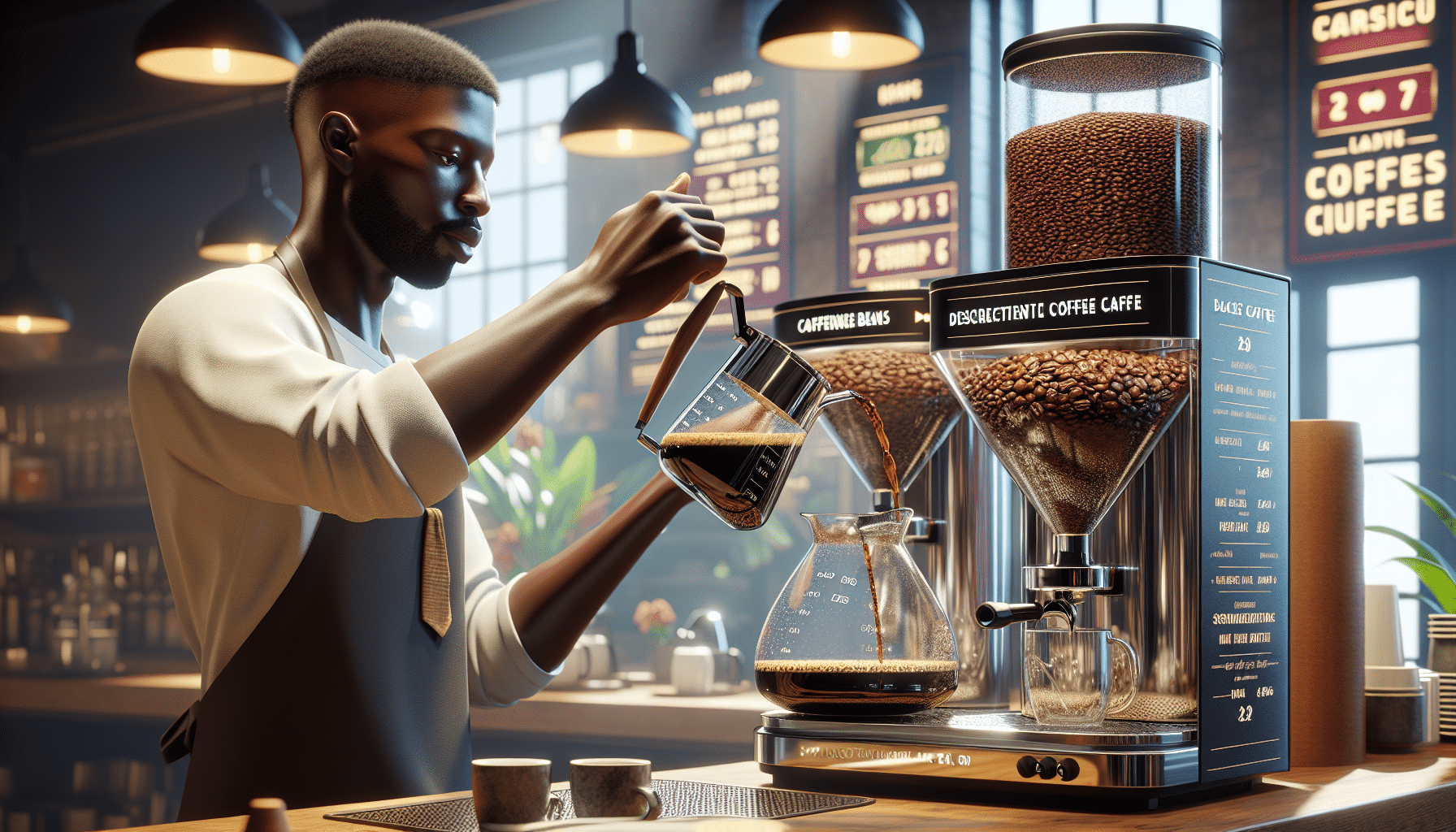
Frequently Asked Questions
Can decaf coffee still stimulate given it contains caffeine?
Although decaf coffee contains significantly less caffeine than regular coffee, individuals extremely sensitive to caffeine may still feel mild effects. However, for most people, decaf coffee won’t provide the usual caffeine kick.
Does the type of coffee bean affect the remaining caffeine in decaf?
Indeed, the type of coffee bean, the decaffeination process used, and how the coffee is brewed all influence the final caffeine content in a cup of decaf coffee.
Can drinking decaffeinated coffee help control caffeine intake?
Yes, switching from regular coffee to decaf is beneficial for individuals looking to limit their caffeine intake without giving up their beloved coffee routine completely.
How does decaf coffee taste compared to regular coffee?
Thanks to advanced decaffeination processes, most decaf coffees maintain the rich taste and aroma of coffee. This makes them a delightful choice for coffee lovers keen on lowering their caffeine intake.
Is decaf coffee completely caffeine-free?
No, decaf coffee is not completely caffeine-free. It retains a significantly reduced level of caffeine, meaning it contains far less caffeine than regular coffee.










